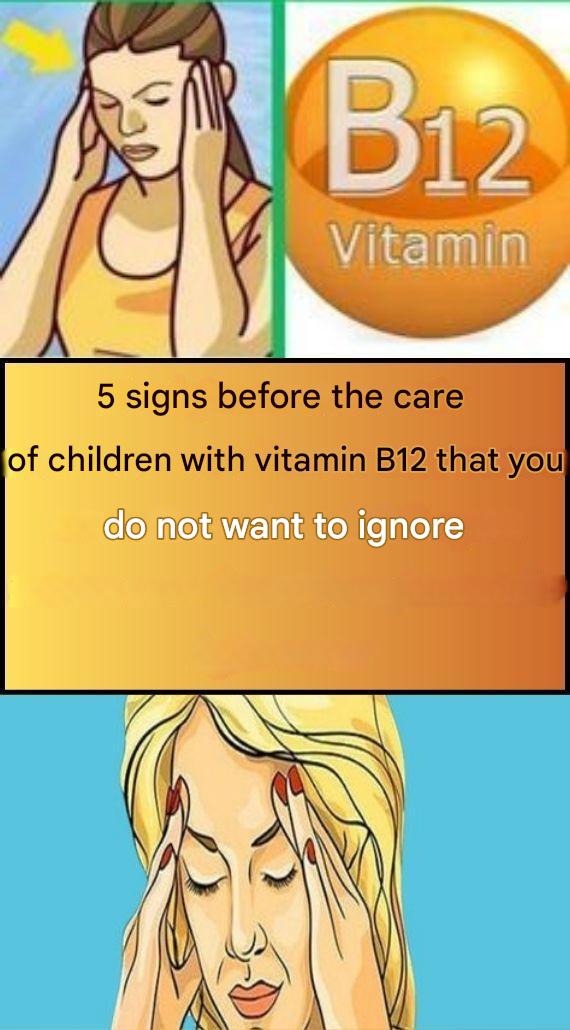ADVERTISEMENT
### **5 Warning Signs of Vitamin B12 Deficiency and How to Address Them**
Vitamin B12, also known as cobalamin, is a crucial water-soluble vitamin that plays a significant role in maintaining the health of your nervous system, producing red blood cells, and supporting your body’s DNA synthesis. A deficiency in B12 can lead to a range of symptoms that may not be immediately noticeable, but can cause long-term health issues if left untreated. Understanding the early warning signs of a vitamin B12 deficiency is important for addressing the problem before it leads to more serious complications.
In this article, we will discuss five key warning signs of vitamin B12 deficiency and what steps you can take to restore your levels to ensure overall health and well-being.
—
### **1. Persistent Fatigue and Weakness**
One of the most common symptoms of vitamin B12 deficiency is feeling excessively tired or weak, even after a full night’s sleep. B12 is essential for red blood cell production, which carries oxygen throughout your body. Without adequate B12, your body may not be able to produce enough healthy red blood cells, resulting in decreased oxygen circulation, leading to feelings of fatigue, weakness, and general lack of energy.
#### **What to Do:**
If you’re experiencing unexplained fatigue, it’s important to consult with your healthcare provider. A blood test can confirm whether you have a B12 deficiency. In many cases, B12 supplementation or dietary adjustments can help restore your energy levels.
—
### **2. Pale or Jaundiced Skin**
A deficiency in B12 can lead to an imbalance in red blood cell production, resulting in anemia. Anemia caused by B12 deficiency often presents itself through pale or yellowish skin, also known as jaundice. This happens because the body struggles to produce healthy red blood cells, leading to a buildup of a substance called bilirubin in the blood, which can cause a yellowish tint to the skin and eyes.
#### **What to Do:**
If you notice pale or jaundiced skin, it’s important to see a doctor for a proper diagnosis. Anemia can often be easily treated with vitamin B12 supplements or changes to your diet.
—
### **3. Tingling Sensations or Numbness**
A lack of vitamin B12 can affect the nervous system, leading to symptoms like tingling, numbness, or a “pins and needles” sensation in the hands, feet, or legs. This occurs because vitamin B12 is involved in the production of myelin, a protective covering around your nerves. Without sufficient B12, the nerves can become damaged, leading to these uncomfortable sensations.
#### **What to Do:**
If you’re experiencing tingling or numbness, it’s important to seek medical attention. If diagnosed early, a B12 deficiency can often be reversed with appropriate treatment, but nerve damage can become permanent if left untreated for too long.
—
### **4. Difficulty with Balance and Coordination**
Vitamin B12 deficiency can also affect your balance and coordination due to its role in nerve health. When the nerves in the spinal cord become damaged from a lack of B12, it can result in problems with walking, coordination, and balance. This can also increase the risk of falls and injuries, especially in older adults.
#### **What to Do:**
If you’re noticing difficulty walking, feeling unsteady, or having trouble with coordination, consult your healthcare provider immediately. Early detection and B12 supplementation can help prevent further nerve damage and restore your motor function.
—
### **5. Cognitive Issues and Memory Problems**
Vitamin B12 plays a vital role in maintaining brain function. A deficiency in this essential vitamin can lead to memory loss, difficulty concentrating, and other cognitive issues. Over time, untreated B12 deficiency has been linked to mood disorders, such as depression and anxiety, and can even contribute to dementia-like symptoms.
For Complete Cooking STEPS Please Head On Over To Next Page Or Open button (>) and don’t forget to SHARE with your Facebook friends
ADVERTISEMENT
